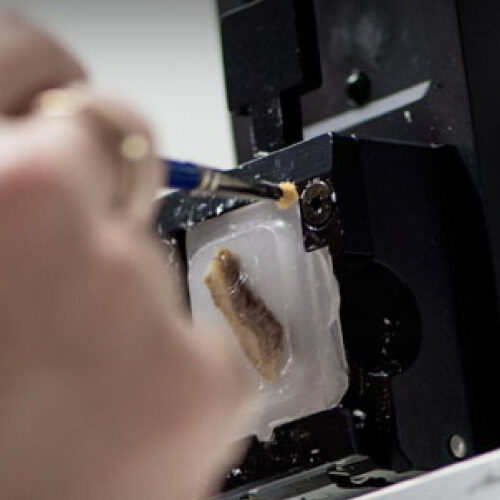
Cancer Center of Eastern Finland (CCEF)
Leaders
Cancer Center of Eastern Finland – CCEF – is an alliance of research groups extending from the fields of basic molecular science to Kuopio University Hospital clinics. CCEF includes strong research infrastructure, wide-ranging national and foreign networking as well as top level scientific research. It consists of five working groups aiming at enhanced patient cure and survival. Focusing on cancer genetics, cancer epigenetics, interaction between cancer cell and tumor stroma, detection of metastatic tumors and identification of novel invasion/metastasis associated molecules and clinical implementation and biobanking, the working groups comprise distinct but mutually reinforcing entities.
CCEF expands the use of modern techniques at the UEF, enforces University’s cancer research status both nationally and internationally and enhances the supervision and guidance of Ph.D thesis studies. Further, CCEF speeds up the time it takes of the scientific finding to become a tool for patient care, supports creating systematic tissue sampling (biobanking) and data handling adding the number of samples available for research projects.
Working Groups
Cancer Center of Eastern Finland consists of five working groups aiming at enhanced patient cure and survival, thus fitting perfectly to the University’s strategy.The Working Groups comprise distinct but mutually reinforcing entities.
-
- Strength of genetic studies of an isolated population, high quality clinical data and material from Kuopio University Hospital area in the search for cancer risk factors and gene-environment -interactions
- Role of EMT related proteins and genes and qualitative and quantitative genetic alterations in the microenvironment of epithelial malignancies
- Genetics and personalized medicine in cancer treatment – pharmacogenetics
- Continue to investigate genetic factors with BCAC
- Role of cancer stem cells in stroma-epithelium microenvironment
New prospective breast cancer project Serine proteases Genetic risk variants 
Figure: Effect of a matriptase-1 expression variant on breast cancer patient survival. -
Epigenetics can be defined as “cellular memory” or heritable changes in gene expression patterns that are not accompanide by changes in DNA sequence. Epigenetic processes are essential to chromatin structure and packaging and interpreting the genome.
The major epigenetic modifications include DNA methylation and histone modifications, especially acetylation and methylation. These mechanisms interact with transcription factors to regulate gene expression patterns inherited from cell to cell.
-
- Factors that couple hyaluronan and related factors to tumor progression
- Therapeutic targets related to hyaluronan
- The role of EMT-related transcription factors in tumors
- In vitro models of EMT
Hyaluronan and related factors in cancer Epithelial-mesenchymal transition Tumor micro-environment -
- Develop animal models for metastatic cancer
- Assessment of peptide-targeted therapy and BL-imaging of tumors and their metastatic lesions
A hallmark of the malignant process is the acquisition of an invasive phenotype that allows neoplastic cells to invade surrounding tissue and disseminate into specific organs. Metastatic spread of cancer is the most serious challenge for cancer treatment and the metastatic dissemination of tumor, rather than primary tumors, is responsible for most cancer deaths.
Unlocking the mysteries of tumor metastasis is essential in the development of novel therapies and diagnostic methods. In patients metastases may remain invisible and due to their primitive status metastatic tumor cells may be highly resistant to therapy. Therefore an urgent need exists to develop highly sensitive biomarkers for early detection of malignant cells outside the main tumor.
-
- Dermatology: Epithelial skin cancers: role of the cells of the immune system, e.g. mast cells and T cells
- Radiology: Tumor imaging: clinical applications of breast MRI
- Oncology: Imrpove medical therapy by using personal genomic variation data
- Surgery: New methods of surgical therapy
- Otorhinolaryngology & Head and Neck Surgery and Obstretrics and Gynecology: Search for new prognostic markers which help in the planning of cencer treatment
Research Groups
Cancer Center of Eastern Finland (CCEF) is an alliance of existing translational research groups extending from the fields of basic molecular science to University Hospital clinics.
-
- enBreast
Oncology – Professor Vesa Kataja - Hyaluronan synthesis, inflammation and cancer
Anatomy – Professors Raija Tammi and Markku Tammi - Mast cells in the peritumoral stroma of epithelial skin cancers
Dermatology – Professor Ilkka Harvima - Molecular virology
Professor Ari Hinkkanen - Molecular pathology and genetics of cancer
Clinical Pathology and Forensic Medicine – Professor Veli-Matti Kosma, Adjunct Professor Arto Mannermaa, Professor Ylermi Soini and Senior Researcher Reijo Sironen - Steroid Receptors and SUMO Modifications in the Regulation of Gene Networks and Cellular Plasticity
Medical Biochemistry – Professor Jorma Palvimo
- enBreast
